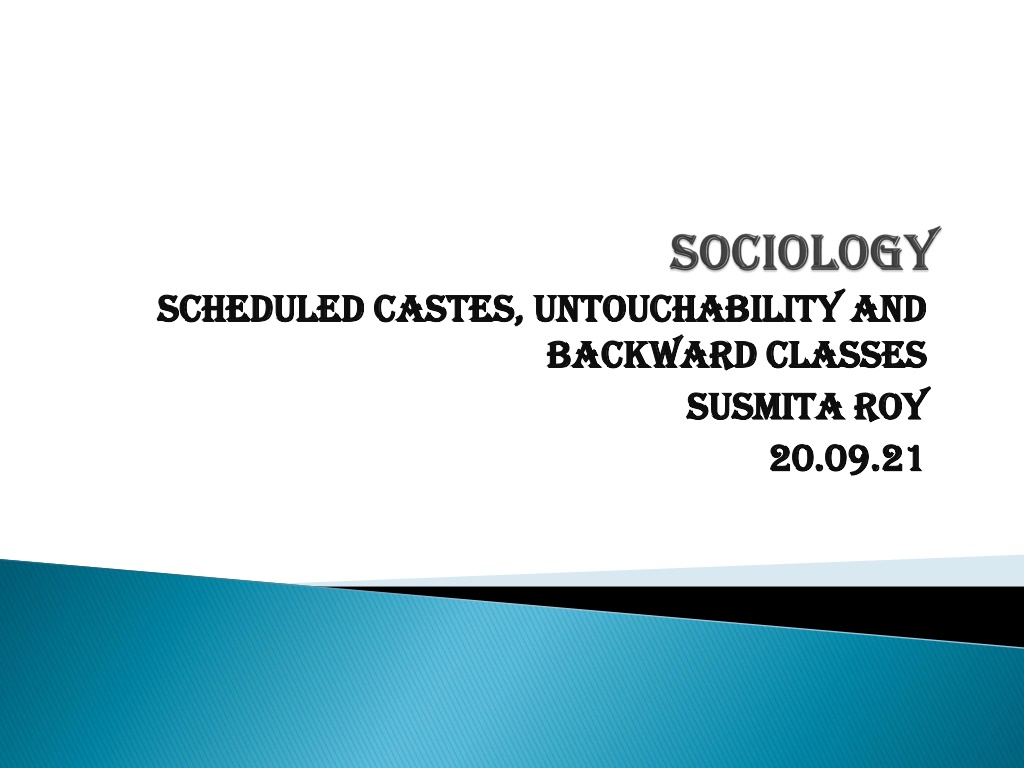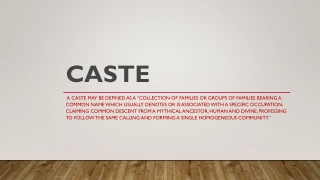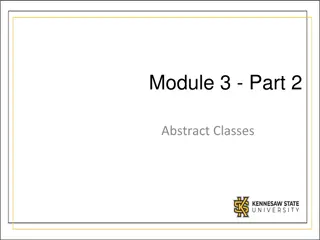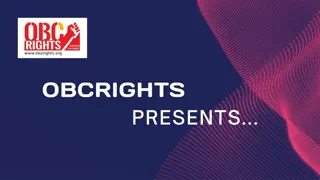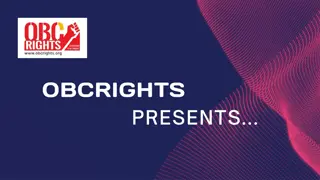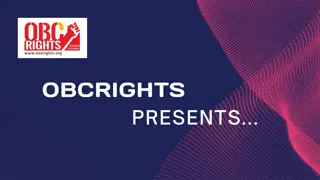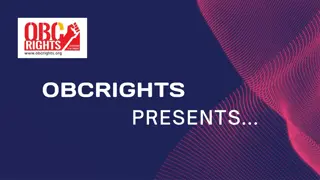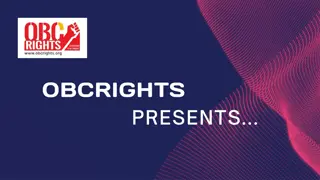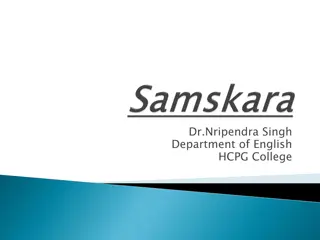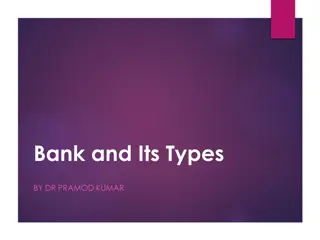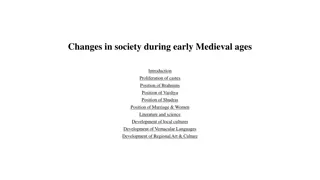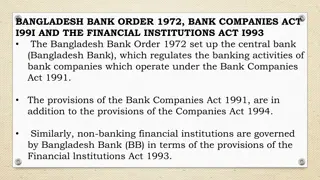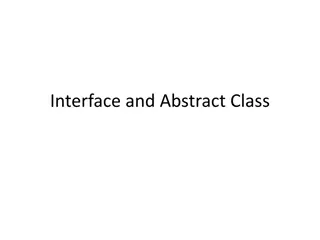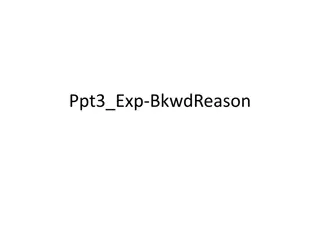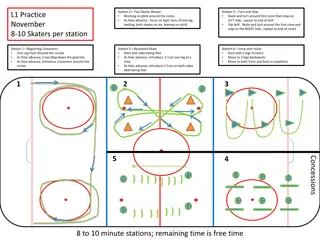Understanding Scheduled Castes, Untouchability, and Backward Classes in India
The Scheduled Castes (SCs) and Scheduled Tribes (STs) in India are officially recognized groups, representing about 16.6% and 8.6% of the population respectively. They were historically known as Depressed Classes and have been given reservation status for political representation. The government has enacted protective laws, including the ban on untouchability and prevention of atrocities, to uplift these marginalized communities through affirmative action like job reservations and access to education.
Download Presentation

Please find below an Image/Link to download the presentation.
The content on the website is provided AS IS for your information and personal use only. It may not be sold, licensed, or shared on other websites without obtaining consent from the author. Download presentation by click this link. If you encounter any issues during the download, it is possible that the publisher has removed the file from their server.
E N D
Presentation Transcript
SCHEDULED CASTES, UNTOUCHABILITY AND SCHEDULED CASTES, UNTOUCHABILITY AND BACKWARD CLASSES BACKWARD CLASSES SUSMITA ROY SUSMITA ROY 20.09.21 20.09.21
Scheduled Castes and Scheduled Tribes The Scheduled Castes (SCs) and Scheduled Tribes (STs) are officially designated groups of people in India. The terms are recognised in the Constitution of India and the groups are designated in one or other of the categories. For much of the period of British rule in the Indian subcontinent, they were known as the Depressed Classes. There are basically five major Varna divisions (or caste or occupational hierarchy) under which, thousands of "jati or jobs or occupations are listed. In modern literature, the Scheduled Castes are sometimes referred to as Depressed Class, meaning "broken/scattered" in Marathi, having been popularised by B. R. Ambedkar (1891 1956), a Depressed Class himself, an economist, reformer, chairman of the Constitution assembly of India, and Depressed Class leader during the independence struggle. Ambedkar preferred the term Dalit to Gandhi's term, Harijan, meaning "person of Hari/Vishnu (or Man of God). In September 2018, the government "issued an advisory to all private satellite channels asking them to 'refrain' from using the nomenclature 'Dalit'", though "rights groups and intellectuals have come out against any shift from 'Dalit' in popular usage". There were twelve original tribes, from which the scheduled or organized tribal names sprang out.
The Scheduled Castes and Scheduled Tribes comprise about 16.6% and 8.6%, respectively, of India's population (according to the 2011 census. The Constitution (Scheduled Castes) Order, 1950 lists 1,108 castes across 28 states in its First Schedule,and the Constitution (Scheduled Tribes) Order, 1950 lists 744 tribes across 22 states in its First Schedule. Since the independence of India, the Scheduled Castes and Scheduled Tribes were given Reservation status, guaranteeing political representation. The Constitution lays down the general principles of positive discrimination for SCs and STs.
Government initiative to improve the situation of SCs and STs The Constitution provides a three-pronged strategy to improve the situation of SCs and STs: Protective arrangements: Such measures as are required to enforce equality, to provide punitive measures for transgressions, and to eliminate established practices that perpetuate inequities. A number of laws were enacted to implement the provisions in the Constitution. Examples of such laws include the Untouchability Practices Act, 1955, Scheduled Caste and Scheduled Tribe (Prevention of Atrocities) Act, 1989, The Employment of Manual Scavengers and Construction of Dry Latrines (Prohibition) Act, 1993, etc. Despite legislation, social discrimination and atrocities against the backward castes continued to persist. Affirmative action: Provide positive treatment in allotment of jobs and access to higher education as a means to accelerate the integration of the SCs and STs with mainstream society. Affirmative action is popularly known as reservation.
Article 16 of the Constitution states "nothing in this article shall prevent the State from making any provisions for the reservation of appointments or posts in favor of any backward class of citizens, which, in the opinion of the state, is not adequately represented in the services under the State". The Supreme Court upheld the legality of affirmative action and the Mandal Commission (a report that recommended that affirmative action not only apply to the Untouchables, but the other backward castes as well). However, the reservations from affirmative action were only allotted in the public sector, not the private. Development: Provide resources and benefits to bridge the socioeconomic gap between the SCs and STs and other communities. Legislation to improve the socioeconomic situation of SCs and STs because twenty-seven percent of SC and thirty-seven percent of ST households lived below the poverty line, compared to the mere eleven percent among other households. Additionally, the backward castes were poorer than other groups in Indian society, and they suffered from higher morbidity and mortality rates.
National commissions To effectively implement the safeguards built into the Constitution and other legislation, the Constitution under Articles 338 and 338A provides for two statutory commissions: the National Commission for Scheduled Castes, and the National Commission for Scheduled Tribes. The chairpersons of both commissions sit ex officio on the National Human Rights Commission. Scheduled Castes in India.
Constitutional history In the original Constitution, Article 338 provided for a special officer (the Commissioner for SCs and STs) responsible for monitoring the implementation of constitutional and legislative safeguards for SCs and STs and reporting to the president. Seventeen regional offices of the Commissioner were established throughout the country. There was an initiative to replace the Commissioner with a committee in the 48th Amendment to the Constitution, changing Article 338. While the amendment was being debated, the Ministry of Welfare established the first committee for SCs and STs (with the functions of the Commissioner) in August 1978. These functions were modified in September 1987 to include advising the government on broad policy issues and the development levels of SCs and STs. Now it is included in Article 342.
In 1990, Article 338 was amended for the National Commission for SCs and STs with the Constitution (Sixty fifth Amendment) Bill, 1990. The first commission under the 65th Amendment was constituted in March 1992, replacing the Commissioner for Scheduled Castes and Scheduled Tribes and the commission established by the Ministry of Welfare's Resolution of 1989. In 2003, the Constitution was again amended to divide the National Commission for Scheduled Castes and Scheduled Tribes into two commissions: the National Commission for Scheduled Castes and the National Commission for Scheduled Tribes. Due to the spread of Christianity and Islam among schedule caste community converted are not protected as castes under Indian Reservation policy. Hence, these societies usually forge their community certificate as Hindus and practice Christianity or Islam afraid for their loss of reservation.
India: Act No. 33 of 1989, Scheduled Castes and the Scheduled Tribes (Prevention of Atrocities) Act, 1989 An Act to prevent the commission of offences of atrocities against the members of the Scheduled Castes and the Scheduled Tribes, to provide for Special Courts for the trial of such offences and for the relief and rehabilitation of the victims of such offences and for matters connected therewith or incidental thereto. Be it enacted by Parliament in the Fortieth Year of the Republic of India as follows: The Scheduled Castes and the Scheduled Tribes (Prevention of Atrocities) Act, 1989 is an Act to prevent the Commission of offences of atrocities against the members of the Scheduled Castes and the Scheduled Tribes and to provide for special Courts for the trial of such offences. By exercising inherent powers Courts are empowered to compound offences under S. C. and S. T. (Prevention of Atrocities) Act, 1989 and Protection of Civil Rights Act, 1955. Public Prosecutor is the officer of the Court who has to essentially assist the Court in dispensing justice. Section 18 of the Act specifies that Section 438 Cr.P.C. has no application to persons committing an offence under the Act.
CHAPTER IPRELIMINARY 1.Short title, extent and commencement: (1)This Act may be called the Scheduled Castes and the Scheduled Tribes (Prevention of Atrocities ) Act, 1989. (2)It extends to the whole of India except the State of Jammu and Kashmir. (3)It shall come into force on such date as the Central Government may, by notification in the Official Gazette, appoint. 2.Definitions: (1)In this Act, unless the context otherwise requires,- (a)"Atrocity" means an offence punishable under Section 3; (b)"Code" means the Code of Criminal Procedure, 1973 (2 of 1974); (c)"Scheduled Castes and Scheduled Tribes" shall have the meanings assigned to them respectively under Clause (24) and Clause (25) of Article 366 of the Constitution; (d)"Special Court" means a Court of Session specified as a Special Court in Section 14;
e)"Special Public Prosecutor" means a Public Prosecutor specified as Special Public Prosecutor or an advocate referred to in Section 15; (f)Words and expressions used but not defined in this Act, and defined in the Code or the Indian Penal Code (45 of 1860) shall have the meanings assigned to them respectively in the Code, or as the ease may be, in the Indian Penal Code. (2)Any reference in this Act to any enactment or any provision there of shall, in relation to an area in which such enactment or such provision is not in force, be construed as a reference to the corresponding law, if any, in force in that area. CHAPTER IIOFFENCES OF ATROCITIES 3.Punishment for offences of atrocities: (1)Whoever, not being a member of a Scheduled Caste or a Scheduled Tribe,- (i)forces a member of a Scheduled Caste or a Scheduled Tribe to drink or eat any inedible or obnoxious substance; (ii)acts with intent to cause injury, insult or annoyance to any member of a Scheduled Caste, or a Scheduled Tribe by dumping excrete, waste matter, carcasses or any other obnoxious substance in his premises or neighbourhood; (iii)forcibly removes clothes from the person of a member of a Scheduled Caste or a Scheduled Tribe or parades him naked or with painted face or body or commits any similar act which is derogatory to human dignity;
(iv)wrongfully occupies or cultivates any land owned by, or allotted to, or notified by any competent authority to be allotted to, a member of a Scheduled Caste or Scheduled Tribe or gets the land allotted to him transferred; (v)wrongfully dispossesses a member of a Scheduled Caste or a Scheduled Tribe from his land or premises or interferes with the enjoyment of his rights any land, premises or water; (vi)compels or entices a member of a Scheduled Caste or Scheduled Tribe to do 'begging' or other similar forms of forced or bonded labour other than any, compulsory service for public purpose imposed by Government; (vii)forces or intimidates a member of a Scheduled Caste or a Scheduled Tribe not to vote or to vote to a particular candidate or to vote in a manner other than that provided by law; (viii)institutes false, malicious or vexatious suit or criminal or other legal proceedings against a member of a Scheduled Caste or a Scheduled Tribe;
(ix)gives any false or frivolous information to any public servant and thereby causes such public servant to use his lawful power to the injury or annoyance of a member of a Scheduled Caste or a Scheduled Tribe; (x)internationally insults or intimidates with intent to humiliate a member of a Scheduled Caste or a Scheduled Tribe in any place within public view; (xi)assaults or uses force to any women belonging to a Scheduled Caste or a Scheduled Tribe with intent to dishonour or outrage her modesty; (xii)being in a position to dominate the will of a woman belonging to a Scheduled Caste or a Scheduled Tribe and uses that position to exploit her sexually to which she would not have otherwise agreed; (xiii)corrupts or fouls the water of any spring, reservoir or any other source ordinarily used by members of the Scheduled Castes or the Scheduled Tribes so as to render it less fit for the purpose for which it is ordinarily used; (xiv)denies a member of a Scheduled Caste or a Scheduled Tribe any customary right of passage to place of public resort or obstructs such member so as to prevent him from using or having access to a place of public resort to which other members of public or any section thereof have a right to use or access to;
xv)forces or causes a member of a Scheduled Caste or Scheduled Tribe to leave his house, village, or other place or residence; shall be punishable with imprisonment for a term which shall not be less than six months but which may extend to five years and with fine. (2)Whoever, not being a member of a Scheduled Caste or a Scheduled Tribe,- (i)gives or fabricates false evidence intending thereby to cause, or knowing it to be likely that he will thereby cause, any member of a Scheduled Caste or a Scheduled Tribe to be convicted of a offence which is capital by the law for the time being in force shall be punished with imprisonment for life and with fine and if an innocent member of a Scheduled Caste or a Scheduled Tribe be convicted and executed in consequence of such false or fabricated evidence, the person who gives or fabricates such false evidence, shall be punished with death; (ii)gives fabricates false evidence intending/hereby to cause, or knowing it to be likely that he will thereby cause, any member of a Scheduled Caste or a Scheduled Tribe to be convicted of an offence which is not capital but punishable with imprisonment for a term of seven years or upwards, shall be punishable with imprisonment for a term which shall not be less than six months but which may extend to seven years or upwards and with fine;
(iii)commits mischief by fire or any explosive substance intending to cause or knowing it to be likely that he will thereby cause damage to any property belonging to a member of a Scheduled Castes or a Scheduled Tribe, shall be punishable with imprisonment for a term which shall not be less than six months but which may extend to seven years and with fine; (iv)commits mischief by fire or any explosive substance intending to cause or knowing it to be likely that he will thereby cause destruction of any building which is ordinarily used as a place of worship or as a place for human dwelling or as a place for custody of the property by a member of a Scheduled Caste or a Scheduled Tribe, shall be punishable with imprisonment for life and with fine; (v)commits any offence under the Indian Penal Code (45 of 1860) punishable with imprisonment for a term often years or more against a person or property on the ground that such person is a member of a Scheduled Caste or a Scheduled Tribe or such property belongs to such member, shall be punishable with imprisonment for life and with fine; (vi)knowingly or having reason to believe that an offence has been committed under this Chapter, causes any evidence of the commission of that offence to disappear with the intention of screening the offender from legal punishment, or with the intention gives any information respecting the offence which he knows or believes to be false, shall be punishable with the punishment provided for that offence; or
vii)being a public servant, commits any offence under this section, shall be punishable with imprisonment for a term which shall not be less than one year but which may extend to the punishment provided for their offence. 4.Punishment for neglect of duties: Whoever, being a public servant but not being a member of a Scheduled Caste or a Scheduled Tribe, wilfully neglects his duties required to be performed by him under this Act, shall be punishable with imprisonment for a term which shall not be less than six months but which may extend to one year. 5.Enhanced punishment for subsequent conviction: Whoever, having already been convicted of an offence under this Chapter is convicted for the second offence or any offence subsequent to the second offence, shall be punishable with imprisonment for a term which shall not be less than one year but which may extend to the punishment provided for that offence. 6.Application of certain provisions of the Indian Penal Code: Subject to the other provisions of this Act, the provisions of Sec. 34, Chapter III, Chapter IV, Chapter V, Chapter V-A, Section 149 and Chapter XXIII of the Indian Penal Code (45 of 1860), shall, so far as may be, apply for the purposes of this Act as they apply for the purposes of the Indian Penal Code.
7.Forfeiture of property of certain persons: (1)Where a person has been convicted of any offence punishable under this Chapter, the Special Court may, in addition to awarding any punishment, by order in writing, declare that any property, movable or immovable or both belonging to the person, which has been used for the commission of that offence, shall stand forfeited to Government. (2)Where any person is accused of any offence under this Chapter, it shall be open to the Special Court trying him to pass an order that all or any of the properties, movable or immovable or both, belonging to him shall during the period of such trial, be attached, and where such trial ends in conviction, the property so attached shall be liable to forfeiture to the extent it is required for the purpose of realisation of any fine imposed under this Chapter.
8.Presumption as to offences: In a prosecution for an offence under this Chapter, if it is proved that- (a)the accused rendered any financial assistance to a person accused of, or reasonably suspected of committing, an offence under this Chapter, the Special Court shall presume, unless the contrary proved, that such person had abetted the offence; (b)a group of persons committed an offence under this Chapter and if it is proved that the offence committed was a sequel to any existing dispute regarding land or any other master, it shall be presumed that the offence was committed in furtherance of the common intention or in prosecution of the common object.
9.Conferment of powers: (1)Notwithstanding anything contained in the Code or in any other provision of this Act, the State Government may, if it considers it necessary or expedient so to do,- (a)for the prevention of and for copying with any offence under this Act, or (b)for any case or class or group of cases under this Act, on any district or part thereof, confer by notification in the Official Gazette, on any officer of the State Government the powers exercisable by a police officer under the Code in such district or part thereof or, as the case may be, for such case or class or group of cases, and in particular, the powers of arrest, investigation and prosecution of persons before any Special Court. (2)All officers of police and all other officers of Government shall assist the officer referred to in sub-section (1) in the execution of the provisions of this Act or any rule, scheme or order made thereunder. (3)The provisions of the Code shall, so far as may be, apply to the exercise of the powers by an officer under sub-section (1).
